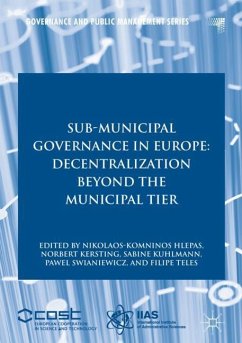
Comparing Strategies of (De)Politicisation in Europe
Governance, Resistance and Anti-politics
Herausgegeben: Buller, Jim; Dönmez, Pinar E.; Standring, Adam; Wood, Matthew

PAYBACK Punkte
53 °P sammeln!
This book investigates the extent to which depoliticisation strategies, used to disguise the political character of decision-making, have become the established mode of governance within societies. Increasingly, commentators suggest that the dominance of depoliticisation is leading to a crisis of representative democracy or even the end of politics, but is this really true? This book examines the circumstances under which depoliticisation techniques can be challenged, whether such resistance is successful and how we might understand this process. It addresses these questions by adopting a nove...
This book investigates the extent to which depoliticisation strategies, used to disguise the political character of decision-making, have become the established mode of governance within societies. Increasingly, commentators suggest that the dominance of depoliticisation is leading to a crisis of representative democracy or even the end of politics, but is this really true? This book examines the circumstances under which depoliticisation techniques can be challenged, whether such resistance is successful and how we might understand this process. It addresses these questions by adopting a novel comparative and interdisciplinary perspective. Scholars from a range of European countries scrutinise the contingent nature of depoliticisation through a collection of case studies, including: economic policy; transport; the environment; housing; urban politics; and government corruption. The book will be appeal to academics and students across the fields of politics, sociology, urban geography, philosophy and public policy.














